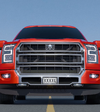- Joined
- 8 June 2008
- Posts
- 13,751
- Reactions
- 20,541
And always the same issue
Embodied energy in batteries is low so we need a lot of these, so EVs are heavy, too heavy...

 www.breitbart.com
The worst is not so much with cars but for utes and semis... horrendous..and the damages on roads, the waste of energy per kw used
www.breitbart.com
The worst is not so much with cars but for utes and semis... horrendous..and the damages on roads, the waste of energy per kw used
Embodied energy in batteries is low so we need a lot of these, so EVs are heavy, too heavy...

Study: Electric Vehicle Batteries Make Cars Too Heavy to Be Stopped by Safety Guardrails
A new car safety study has proven that electric vehicles (EVs) are too heavy to be restrained by guardrails.

